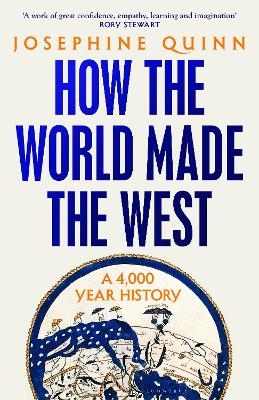
How the World Made the West
A 4,000-Year History
Seiten
2024
Bloomsbury Publishing PLC (Verlag)
978-1-5266-0518-4 (ISBN)
Bloomsbury Publishing PLC (Verlag)
978-1-5266-0518-4 (ISBN)
A Guardian, Financial Times, New Statesman, The Rest is Politics and Waterstones Highlight for 2024
'Quinn has done a lot more than reinvent the wheel. What we have here is a truly encyclopaedic and monumental account of the ancient world' THE TIMES
'A work of great confidence, empathy, learning and imagination' RORY STEWART
'Bold, beautifully written and filled with insights . . . Extraordinary' PETER FRANKOPAN
'One of the most fascinating and important works of global history to appear for many years' WILLIAM DALRYMPLE
The West, the story goes, was built on the ideas and values of Ancient Greece and Rome, which disappeared from Europe during the Dark Ages and were then rediscovered by the Renaissance. But what if that isn’t true?
In a bold and magisterial work of immense scope, Josephine Quinn argues that the real story of the West is much bigger than this established paradigm leads us to believe. So much of our shared history has been lost, drowned out by the concept – developed in the Victorian era – of separate ‘civilisations’.
Moving from the Bronze Age to the Age of Exploration, How the World Made the West reveals a new narrative: one that traces the millennia of global encounters and exchange that built what is now called the West, as societies met, tangled and sometimes grew apart. From the creation of the alphabet by Levantine workers in Egypt, who in a foreign land were prompted to write things down in their own language for the first time, to the arrival of Indian numbers in Europe via the Arab world, Quinn makes the case that understanding societies in isolation is both out-of-date and wrong. It is contact and connections, rather than solitary civilisations, that drive historical change. It is not peoples that make history – people do.
'Quinn has done a lot more than reinvent the wheel. What we have here is a truly encyclopaedic and monumental account of the ancient world' THE TIMES
'A work of great confidence, empathy, learning and imagination' RORY STEWART
'Bold, beautifully written and filled with insights . . . Extraordinary' PETER FRANKOPAN
'One of the most fascinating and important works of global history to appear for many years' WILLIAM DALRYMPLE
The West, the story goes, was built on the ideas and values of Ancient Greece and Rome, which disappeared from Europe during the Dark Ages and were then rediscovered by the Renaissance. But what if that isn’t true?
In a bold and magisterial work of immense scope, Josephine Quinn argues that the real story of the West is much bigger than this established paradigm leads us to believe. So much of our shared history has been lost, drowned out by the concept – developed in the Victorian era – of separate ‘civilisations’.
Moving from the Bronze Age to the Age of Exploration, How the World Made the West reveals a new narrative: one that traces the millennia of global encounters and exchange that built what is now called the West, as societies met, tangled and sometimes grew apart. From the creation of the alphabet by Levantine workers in Egypt, who in a foreign land were prompted to write things down in their own language for the first time, to the arrival of Indian numbers in Europe via the Arab world, Quinn makes the case that understanding societies in isolation is both out-of-date and wrong. It is contact and connections, rather than solitary civilisations, that drive historical change. It is not peoples that make history – people do.
Josephine Quinn is Professor of Ancient History at Oxford University, and Martin Frederiksen Fellow and Tutor of Ancient History at Worcester College, Oxford. She has degrees from Oxford and UC Berkeley, has taught in America, Italy and the UK, and co-directed the Tunisian-British archaeological excavations at Utica. She is a regular contributor to the London Review of Books, as well as to radio and television programmes. Quinn has been elected as the first woman to hold the Professorship of Ancient History at the University of Cambridge and will join the Faculty in 2025.
| Erscheinungsdatum | 20.02.2024 |
|---|---|
| Verlagsort | London |
| Sprache | englisch |
| Maße | 153 x 234 mm |
| Themenwelt | Literatur ► Biografien / Erfahrungsberichte |
| Literatur ► Essays / Feuilleton | |
| Geschichte ► Allgemeine Geschichte ► Vor- und Frühgeschichte | |
| Geisteswissenschaften ► Philosophie ► Geschichte der Philosophie | |
| Geisteswissenschaften ► Philosophie ► Philosophie der Neuzeit | |
| ISBN-10 | 1-5266-0518-X / 152660518X |
| ISBN-13 | 978-1-5266-0518-4 / 9781526605184 |
| Zustand | Neuware |
| Haben Sie eine Frage zum Produkt? |
Mehr entdecken
aus dem Bereich
aus dem Bereich
auf den Spuren der frühen Zivilisationen
Buch | Hardcover (2023)
C.H.Beck (Verlag)
CHF 27,95
Konzepte – Methoden – Theorien
Buch | Softcover (2024)
UTB (Verlag)
CHF 55,85
Was Pompeji über uns erzählt
Buch | Hardcover (2023)
Propyläen (Verlag)
CHF 44,75


